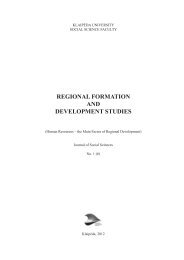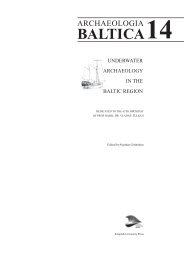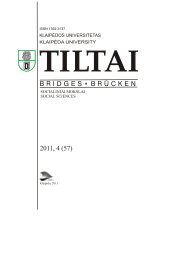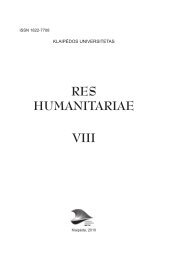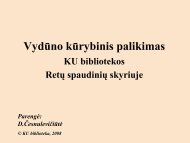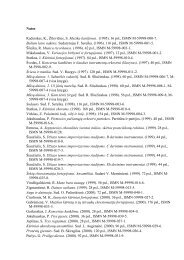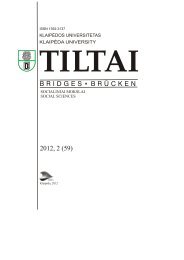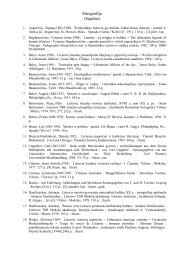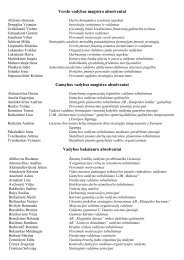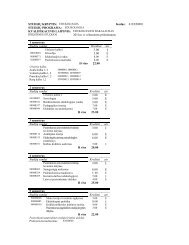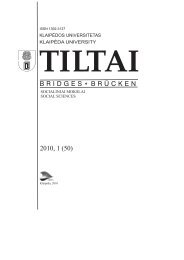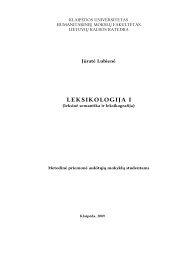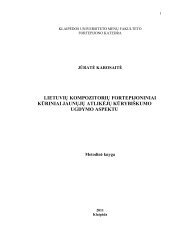2013,1 (62) - KlaipÄdos universitetas
2013,1 (62) - KlaipÄdos universitetas
2013,1 (62) - KlaipÄdos universitetas
You also want an ePaper? Increase the reach of your titles
YUMPU automatically turns print PDFs into web optimized ePapers that Google loves.
Asta Budreikaitė<br />
Lately the studies in different countries (Krawczyk, 1990; Brettschneider, Heim,<br />
1997; Sukys, 2001; Oweis, Spinks, 2001; Danish et al., 2003; Klomsten et al., 2004;<br />
Moreno Cervelló, 2005) showed that sporting activities can have a positive impact not<br />
only on physical but also on spiritual development of adolescents, as sporting activity<br />
is one of the most significant factors having a positive impact on the emerging system<br />
of values of adolescents, their character formation and others. R. Naul (2008) argues<br />
that Olympic values and ethical-moral principles applied in sport activities can help<br />
students learn how to behave with integrity in other activities as well.<br />
This indicates, that the problem of Olympic education, Olympic ideals and values<br />
is also relevant today. However, the scientific literature lacks in–depth, systemic empirical<br />
research on the expression and development of moral values that includes all<br />
three – cognitive, emotional and behavioural – components using Olympic education<br />
as a multifunctional phenomenon, uniting the elements of Olympic culture – the<br />
knowledge, behavioural skills and abilities as well as moral attitudes. Therefore it is<br />
important to prepare methodics of diagnostics that will help the educators to evaluate<br />
the results of pupils’ moral education and this requires comprehensive research of<br />
diagnostic moral education, that would have not only pedagogical but also a social<br />
meaning (Bitinas, 2010, p. 153).<br />
The research aim – to determine adolescents’ (12–13 years) expression of moral<br />
values and to verify the effectiveness of Olympic education.<br />
The research tasks:<br />
1. To reveal the cognitive level of the expression of adolescents’ moral values.<br />
2. To describe the impact of the empirically tested Olympic education on adolescents’<br />
expression of moral values<br />
The research method: scientific literature analysis, abstraction and systemization,<br />
description of values, educational experiment, statistical analysis.<br />
The organization of the research. The pedagogical experiment was carried out in<br />
four schools of secondary education in Lithuania. The length of the research – one<br />
year (2008–2009). There was one experimental (E) and one control (C) group in each<br />
of the four schools. 126 pupils took part in the pedagogical experiment. 60 sixthformers<br />
made up the experimental group and 66 sixth-formers comprised the control<br />
group. 59.3 % girls and 40.7 % boys were in E group. The ratio of girls and boys in C<br />
group was similar (57.5 % girls and 42.5 % boys). During the experiment there were<br />
two measurements made: the first diagnostic I in September of 2008 and the second<br />
diagnostic II measurement was made after the implementation of the programme in<br />
June of 2009.<br />
The most significant changes were observed in the assessment of self-respect and<br />
respect, slightly less – obedience and responsibility, and the least – fairness. The results<br />
revealed that the teenagers in the experimental group were able to better define<br />
the essence of moral values as their level of awareness of values, i.e. complete and<br />
very detailed, increased significantly more than that of the control group students.<br />
Therefore, value internalisation of teenagers in the experimental group is higher than<br />
in the control group.<br />
132



